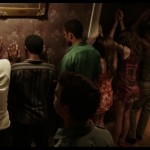As O’Connor suggests, we should judge art by vision–how well the artist sees the true nature of things and reflects it accurately back to the audience. And, as she also urges, we should encourage Christian artists in mastering their craft. She writes, “It is the business of every writer to push his talent to its outermost limit” (“Catholic Novelists,” 170). The first focus of the Christian artist is to glorify God by making good art, not by bringing about some utilitarian end. As O’Connor writes, “It is the nature of fiction to be good for much unless it is good in itself” (“The Nature and Aim of Fiction,” 81).
To help the Christian artist see more clearly and devote themselves more fully to their craft, we should encourage artists to think about how the incarnation relates to their art, which O’Connor links to the sensory nature of good art: “If you shy away from sense experience, you will not be able to read fiction; but you will not be able to apprehend anything else in this world either, because every mystery that reaches the human mind, except in the final stages of contemplative prayer, does so by way of the senses. Christ didn’t redeem us by a direct intellectual act, but became incarnate in human form, and he speaks to us now through the mediation of a visible Church” (“Catholic Novelists,” 176). Art that is created by Christians that is good will see, hear, taste, smell, and touch like reality, just as Christ entered fully and bodily into a real sensory world, not a cleaned-up world or ethereal world.
And what of those who cannot bear to engage with media that is laden with all the messy bits of reality our world is fraught with? We should not judge them, nor should they judge us. O’Connor charitably grants, “It is very possible that what is vision and truth to the writer is temptation and sin to the reader. There is every danger that in writing what he sees, the novelist will be corrupting some ‘little one,’ and better a millstone were tied around his neck. … But I think that to force this kind of total responsibility on the novelist is to burden him with the business that belongs only to God” (“Catholic Novelist,” 187).
Looking for Thoughtful Christian Writers?
If this piece has made you hungry for better Christian engagement with art, I have a number of recommendations. In addition to Overstreet, there are other Christians I know who are doing the good work of reflecting on art from the posture of faith. I recommend the following:
Wade Bearden and Kevin McLenithan
Christianity Today’s Movies & TV section
Community discussion guidelines:
Because this is a Christian blog, the things’m talking about will obviously be topics that people feel strongly about in one direction or another. Please keep in mind that this is a place for substantive, respectful, constructive conversation. All perspectives are welcome to discuss here as long as all can treat each other with kindness and respect. Please ignore trolls, refuse to engage in personal attacks, try not to derail the conversation into divisive rabbit trails, and observe the comment policy listed on the right side of the page. Comments that violate these guidelines may be deleted. Vulgar remarks may result in immediate blacklisting. For those who clearly violate these policies repeatedly, my policy is to issue a warning which, if not regarded, may lead to blacklisting. This is not about censorship, but about creating a healthy, respectful environment for discussion.
P.S. Please also note that I am not a scientist, but a person with expertise in theology and the arts. While I am very interested in the relationship between science and faith, I do not believe I personally will be able to adequately address the many questions that inevitably come up related to science and religion. I encourage you to seek out the writings of theistic or Christian scientists to help with those discussions.












